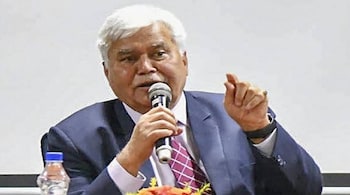Dismissing the "rumours" of technical glitches in Co-WIN platform, RS Sharma, Chairman of Empowered Group on Vaccine Administration (Co-WIN), on March 1 said the confusion was created by spreading misinformation that vaccination registration is being done through a mobile application.
There were rumours that people who want to book an appointment for COVID-19 vaccination should register on Co-WIN app instead of Co-WIN website.
The National Heath Authority CEO clarified that the registration for vaccine is taking place only through Aarogya Setu app and Co-WIN’s portal cowin.gov.in.
Speaking to ANI, Sharma said ,"There has been no glitch right from the start. What happened was that some people spread the misinformation that there is a Co-WIN app. So, people started searching for the app which is not ours. That is why there was some confusion among the people. After clarifying there is no Co-WIN app, we have given an extension in Aarogya Setu app for registration and provided a portal ‘cowin.gov.in’.
As the second phase of nationwide vaccination drive against the coronavirus disease started on March 1, 17 lakh people have registered for the vaccination against COVID-19 so far since the morning. This system is working fine and there is no glitch, he said.
The former Telecom Regulatory Authority of India (TRAI) chief also hailed Prime Minister Narendra Modi, who received the first jab of Covaxin at AIIMS, Delhi, adding that this will give a strong message to reduce the vaccine hesitancy among people.
“Vaccine hesitancy is a social perspective. But today, Prime Minister Narendra Modi took the jab on the first day itself is a big message and people will be encouraged for taking the vaccine. Gradually, it will end the vaccine hesitancy,” he said.
On certificate given to people after taking vaccination, he said, “We have given the instruction to all, whether private or public, that as soon as a vaccination is completed, a certificate must be given to the person on the spot. That certificate will also be made available digitally as well on Aarogya Setu.”
“They can download the link and get it printed as well. This will be a digitally signed certificate. After every vaccination, a certificate will be issued. After first vaccination, a provisional certificate will be provided and a final certificate will be issued after the second dose,” he added.
Responding to data privacy and safety, he said, “Data privacy is also important for us and it is a fundamental right. We are just asking for name, gender and age related data. It is not extremely sensitive data. This is important for us so that person who gets a particular vaccine should get the same vaccine in the second dose as well. Whatever data we have are safe.”
Those who could not attend the scheduled vaccination drive can reschedule, cancel, or take reappointment for the same.
Sharma also said digital and paperless authentication is possible only through Aadhar Card. If a person brings Aadhar, he or she does not need to bring a hardcopy. In case of driving license, passport and other ID proofs, photograph of the document will be taken along with photo of the person, reported ANI.
The second phase of the nationwide COVID-19 vaccination drive for age-appropriate population groups (people above 60 and those with comorbidities above 45) began on Monday with the Union Health Ministry calling out eligible people to get an appointment at respective hospitals in the country.
With inputs from ANI
Discover the latest Business News, Sensex, and Nifty updates. Obtain Personal Finance insights, tax queries, and expert opinions on Moneycontrol or download the Moneycontrol App to stay updated!









